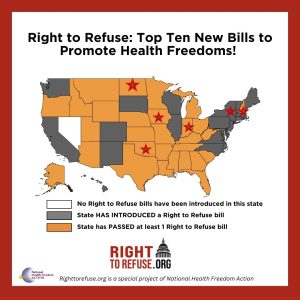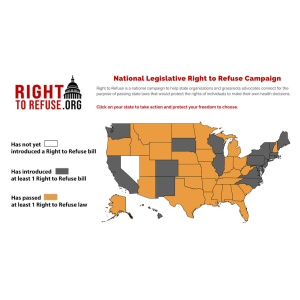

Tell Your Senators to OPPOSE California Senate Bill 18
NO LONGER ACTIVE – Bill Not Passed Before Session Ended
Californians -Please Enter Your Zip Code NOW and Tell Your Senators to OPPOSE California Senate Bill 18
SB18 is an Assault on the Fundamental Right of Parents to Raise Their Children
Please Click Here and write to your California Senator and OPPOSE CA SB 18 because it would undermine family relationships in California. CA SB18 would be dangerous for child development in California. It would give bureaucrats the power to decide what the standards are for raising children instead of parents. It would destroy the fundamental right of parents and families in the raising of children. It would over-turn the sensitive balance of extensive family laws already in place in California that address the needs of parents and children and the laws that protect family relationships whenever possible. Take Action Here.
National Health Freedom Action (NHFA) is supportive of children and youth of all ages and supports California existing law protecting children in the context of their family relationships. NHFA honors and appreciates the fundamental right of California parents to raise their children. NHFA acknowledges the right of the state of California to intervene in special circumstances where a family member may be in danger. CA has extensive existing laws in place for children, youth, and families addressing numerous areas of law. Each area of law with its own challenges and standards.
When a child is born, the mother and father or legal guardians have complete charge of their child and have fundamental rights of parenting and setting their own family standards, and the state depends on these parents to provide for the welfare of their children. If the state is in disagreement about how the child is raised, it may not step in except for unique circumstances where a family member is in danger, and the state has designed numerous laws to address specific situations regarding finding balance between the rights of the child and the rights of parents. State employees are charged with the goal of honoring and working to protect the family and the well-being of all of its members.
A child bill of rights without a parental bill of rights is a misunderstanding of the nature and the legal rights of parents in the family unit and the laws regarding family. Given this aggressive SB 18 bill, California should counter it by considering introducing a bill of rights for families or parents, further codifying the fundamental right of parents to raise their children. The state does not have the duty to raise the children, but only to intervene in a family in certain circumstances of danger to members.
In 2009 a County in California introduced a resolution regarding the rights of children and it was endorsed by the California legislature. The County leaders of Silicon Valley most likely had a desire to promote the concept and good will that all children might have the opportunities provided to some of their offspring. However, a resolution is an intention, it is not a binding law. And SB 18 would be a law. And SB18 is attempting to put into law some of those intentions and even expanding them, and that is where a resolution of good will can become dangerous.
The danger is that laws, unlike resolutions, are enforceable, and a new and broad overreaching law could impact and sometimes change how an existing law already in place is applied. SB18 has very broad and dangerous language in it declaring broad rights for a child without mentioning impact on the rights of parents and guardians that would impact the careful balance CA law already has in place dealing with family relationships.
California already has laws protecting the best interest of the child and the state works hard to respond to the needs of children and families in need. If CA SB18 passed, for example, would a new child rights law change the understanding of the “best interest of the child” standard in the California family law code to give more rights to children than to parents? And would all of the family law sections have to be re-interpreted to put a child rights or preferences first before a parent or the family unit? That is exactly what happened in the state of Washington when this type of language was put into law in the past. There were so many bad ridiculous cases under the new law that Washington went back and changed the law later. (For example, a child was put in a foster home in Washington because the parents wanted the child to go to church three times a week). SB18 reads as if the state believes it is legally responsible for raising the children instead of parents, and it does not mention the rights of members of the family unit at all. This goes against all of the intense work of the people enforcing the CA Family Code as they have searched to balance the best interest of the child with circumstances that arise in the family.
The below table is a comparison of the 2009 California resolution, the 2017 SB18, and a small sample section of the existing California Family Law Code. Note how many things are already taken into consideration even in just one small section of the family code. CA has an extensive Family Law Code that regulates the best interest of children and families.
NHFA opposes SB18 and encourages CA to consider a resolution honoring the family and honoring their laws that are in place to ensure the safety and well-being of children and adults within that family.
|
| |
CA 2009 Assembly Concurrent Resolution No. 80, Resolution Chaptered 101 | CA 2016 SENATE BILL No. 18 Introduced December 5, 2016
| Current CA Family Law Code – FAM
|
Filed with Secretary of State September 16, 2009. Relative to a Bill of Rights for the Children and Youth of California. | An act relating to children and youth. | CHAPTER 2. Matters To Be Considered in Granting Custody [3040 – 3049] (Chapter 2 repealed and added by Stats. 1993, Ch. 219, Sec. 116.50. ) |
ACR 80, Hill. Bill of Rights for the Children and Youth of California. | SB 18, Bill of Rights for Children and Youth in California.
Existing law provides for the care and welfare of children and youth in various contexts, including, but not limited to, child welfare services, foster care, health care, nutrition, homeless assistance, and education. Assembly Concurrent Resolution No. 80 (Res. Ch. 101, Stats. 2009) declares the Legislature’s support of a Bill of Rights for the Children and Youth of California that resolves to invest in all children and youth in order to achieve specified goals to create an optimal environment for their healthy development. This bill would declare the intent of the Legislature to expand and codify the Bill of Rights for Children and Youth of California to establish a comprehensive framework that governs the rights of all children and youth in California, outlines the research-based essential needs of California’s children, and establishes standards relating to the health, safety, well-being, early childhood and educational opportunities, and familial supports necessary for all children to succeed. The bill would declare the intent of the Legislature, by January 1, 2022, to enact legislation for the purpose of ensuring that the Bill of Rights for Children and Youth of California, in its totality, is applied evenly, equitably, and appropriately to all children and youth across the state. | Section 3040.
(a) Custody should be granted in the following order of preference according to the best interest of the child as provided in Sections 3011 and 3020:
(1) To both parents jointly pursuant to Chapter 4 (commencing with Section 3080) or to either parent. In making an order granting custody to either parent, the court shall consider, among other factors, which parent is more likely to allow the child frequent and continuing contact with the noncustodial parent, consistent with Sections 3011 and 3020, and shall not prefer a parent as custodian because of that parent’s sex. The court, in its discretion, may require the parents to submit to the court a plan for the implementation of the custody order.
(2) If to neither parent, to the person or persons in whose home the child has been living in a wholesome and stable environment.
|
Legislature’s support for a Bill of Rights for the Children and Youth of California that resolves to invest in all children and youth so that certain goals may be achieved. | ||
WHEREAS, The Peninsula Partnership Leadership Council, which is made up of leaders from multiple disciplines throughout San Mateo County, has a mission to formulate policies thateffectively address the needs and foster the healthy development of children, youth, and families; and | ||
| WHEREAS, The Peninsula Partnership Leadership Council believes that all children and youth have rights to live in a just, moral, and supportive society; all children and youth have the same rights regardless of their culture, race, gender or gender identity, sexual orientation, religion, or disability; and all children and youth have the right to a better world than they inherited; and | ||
| WHEREAS, The Peninsula Partnership Leadership Council has drafted the Peninsula Partnership Leadership | ||
Council Bill of Rights for the Children and Youth of San Mateo County to draw the attention of all county and | (3) any other person or persons deemed by the court to be suitable and able to provide adequate and proper care and guidance for the child. (b) The immigration status of a parent, legal guardian, or relative shall not disqualify the parent, legal guardian, or relative from receiving custody under subdivision (a). (c) This section establishes neither a preference nor a presumption for or against joint legal custody, joint physical custody, or sole custody, but allows the court and the family the widest discretion to choose a parenting plan that is in the best interest of the child. (d) In cases where a child has more than two parents, the court shall allocate custody and visitation among the parents based on the best interest of the child, including, but not limited to, addressing the child’s need for continuity and stability by preserving established patterns of care and emotional bonds. The court may order that not all parents share legal or physical custody of the child if the court finds that it would not be in the best interest of the child as provided in Sections 3011 and 3020. (Amended by Stats. 2013, Ch. 564, Sec. 2. Effective January 1, 2014.) | |
local agencies, parents, guardians, and private enterprises, and to provide guidance in decision-making in order to address the needs and foster the healthy development of all children, youth, and families; and | ||
WHEREAS, The principles and goals of the Peninsula Partnership Leadership Council Bill of Rights for the Children and Youth of San Mateo County are equally applicable at the statewide level; now, therefore, be it | ||
Resolved by the Assembly of the State of California, the Senate thereof concurring, That the Legislature supports a Bill of Rights for the Children and Youth of California that resolves to invest in all children and youth so that the following goals may be achieved: | ||
The people of the State of California do enact as follows: SECTION 1. (a) The Legislature finds and declares that all children and youth, regardless of gender, class, race, ethnicity, national origin, culture, religion, immigration status, sexual orientation, or ability, have inherent rights that entitle them to protection, special care, and assistance, including, |
(1) They have healthy minds, bodies, and spirits that enable them to maximize their potential. (2) They each develop a healthy attachment to a parent, guardian, or caregiver, and an ongoing relationship with a caring and supportive adult. (3) Their essential needs are met, including, but not limited to, nutritious food, shelter, clothing, health care, and accessible transportation. (4) They have safe and healthy environments, including, but not limited to, homes, schools, neighborhoods, and communities. (5) They have access to a 21st century education that promotes success in life, in future careers, and a love of lifelong learning. (6) They have training in life skills that will prepare them to live independently, be self-sufficient, and contribute to their community. (7) They have employment opportunities with protections from unfair labor practices. (8) They have freedom from mistreatment, abuse, and neglect. (9) They have a voice in matters that affect them. (10) They have a sense of hope for their future; and be it further Resolved, That the Legislature desires that every child and youth in this state should have the opportunities set forth in the Bill of Rights for the Children and Youth of California; and be it further Resolved, That the Chief Clerk of the Assembly transmit copies of this resolution to the author for appropriate distribution. | (1) The right to parents, guardians, or caregivers who act in their best interest. (2) The right to form healthy attachments with adults responsible for their care and well-being. (3) The right to live in a safe and healthy environment. (4) The right to social and emotional well-being. (5) The right to opportunities to attain optimal cognitive, physical, and social development. (6) The right to appropriate, quality education and life skills leading to self-sufficiency in adulthood. (7) The right to appropriate, quality health care. (b) It is the intent of the Legislature in enacting this act to expand and codify the Bill of Rights for Children and Youth of California created by Assembly Concurrent Resolution No. 80 (Res. Ch. 101, Stats. 2009), to establish a comprehensive framework that governs the rights of all children and youth in California, outlines the research-based essential needs of California’s children, and establishes standards relating to the health, safety, well-being, early childhood and educational opportunities, and familial supports necessary for all children to succeed.
SEC. 2. It is the intent of the Legislature, by January 1, 2022, to enact appropriate legislation to accomplish all of the following: (a) Develop and put forth research-based policy solutions that will ensure the Bill of Rights for Children and Youth of California, in its totality, is applied evenly, equitably, and appropriately to all children and youth across the state. (b) Determine the amount of revenue and resources necessary to ensure that the Bill of Rights for Children and Youth of California, in its totality, is applied evenly, equitably, and appropriately to all children and youth across the state. (c) Identify and obtain the revenue and resources necessary to ensure that the Bill of Rights for Children and Youth of California, in its totality, is applied evenly, equitably, and appropriately to all children and youth across the state |
RECENT NEWS



Will Health Freedom See Gains In 2026?

